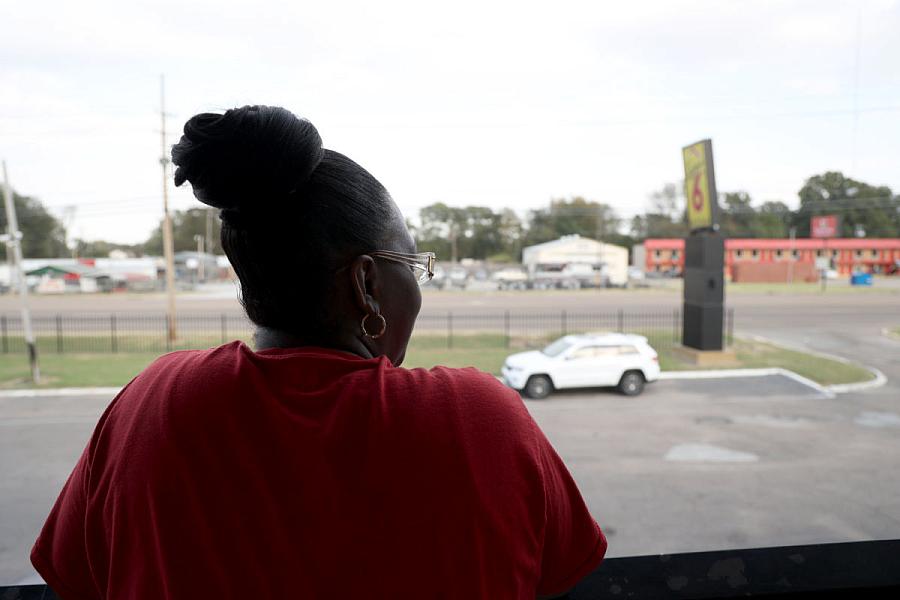Simply being there proves crucial to covering plight of displaced tenants in Mississippi Delta community

A resident looks at from a balcony at hotel room after being displaced from her home at Sunset Village in Cleveland, Mississippi in 2022.
Photo by Nick Judin/Mississippi Free Press
One lesson stands out from my time reporting in the Mississippi Delta on the mass constructive evictions of residents from an apartment complex there called Sunset Village: Be there.
It’s a simple demand, but it’s easily obscured by the connectedness of the world today. There is no substitute for being there.
When I first heard from sources that something terrible was occurring in Cleveland, Mississippi, I used my connections within the state to find as many impacted residents as I could. Their stories were dire — a gas leak in a crumbling apartment complex had killed a young family and forced hundreds out of their homes and into temporary accommodations at a pair of roadside motels.
I made the decision to travel there immediately. That proved valuable for more reasons than I expected. First, it created a sense of trust with the residents. I spent days at the apartment complex and the motels where countless families were living in appalling conditions. I spent time with mothers and fathers with their children nearby, and went with them back to their quickly evacuated homes, personally inspecting the state of decay many of their units had experienced.
This was the second boon to my reporting: I was present for the events as they occurred. The situation at Sunset Village was evolving rapidly. I knew from earlier coverage of mass evictions in Starkville, a college town far to the east of the Delta, that the formal narrative offered by corporate spokespeople rarely matches the pressure and stress on the ground. On a daily basis I encountered written directives from officials which were drastically different from what residents were told.
All of the residents I spoke with understood that they were experiencing something unjust. Many juggled children and dependent family members without the security of home. Some faced permanent eviction threats even amid the weeks and months of displacement from their homes. But I strongly believe that it was my presence there, not relayed by phone or the internet, that convinced many residents to share their experiences with me and invite me into intimate, painful moments.
While physical presence was a huge part of why I was able to successfully tell the story of Sunset Village, more was necessary to ensure I built a complete network of sources and maintained their trust.
Keeping composure: Much of what I saw in Cleveland over the days and weeks that I visited was terrible to witness. Children and elders struggled in dangerous living conditions. Families and parents were at their wits’ end trying to keep calm in unbearable circumstances. Some families were torn apart, forced to seek shelter elsewhere in the state. In the months that followed, I learned that too many stayed torn apart.
But the residents of Sunset Village had already grown used to the worst of it. There were few tears. What happened there was already a failure of civic leadership and media presence. Do not expect an underserved community you are covering to have much tolerance for your squeamishness or shock. The reality that they endure is certainly not a surprise to them, and you have a responsibility as a journalist to remain composed and proactive even as you deeply empathize with their experiences.
My time in the Delta was not without its direct challenges. I experienced attempts to remove me from the premises and bar me from reporting on what was occurring. Meaningful journalism is not without its risks, which is why understanding how to mitigate them is critical. Know the law and stand on it when pressed. Even when the police were involved, I relied on the support of the residents and the letter of the law, as well as the assistance of the Mississippi Center for Justice, to ensure that my reporting at Sunset Village could continue.
My time reporting in Cleveland continues to inform an ongoing lawsuit against the corporate management of Sunset Village. But this reporting, supported by the Center for Health Journalism’s National Fellowship, made it clear that what little protections are available to renters in Mississippi are poorly understood and sparsely enforced. The consequences reverberate in towns across the South, and often goes uncovered by journalism.
In your community too there are no doubt at-risk families. I hope others are given the time and resources to see what the state of housing in their regions is. These events do not exist in a vacuum — they represent a pattern of behavior and have real, measurable effects on the health and safety of entire populations.

